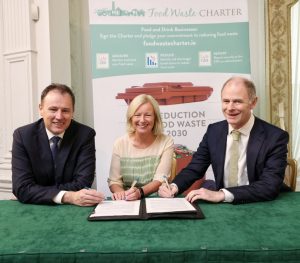Call for organisations to help cut Ireland’s food waste by 50%

Minster McConalogue, Laura Burke and Minister Smyth
All businesses and state agencies operating across the food supply chain have been called on to help Ireland reduce its food waste.
The Environmental Protection Agency’s (EPA) new Food Waste Charter – which builds on its 2017 charter that focused on the grocery retail sector – expands the call to action to every organisation in Ireland’s food supply chain.
Businesses signing up to the Food Waste Charter voluntarily commit to measure their food waste, set targets, and take action to reduce food waste, and to report annually on progress.
In 2020, Ireland generated 770,000 tonnes of food waste across primary production, manufacturing & processing, distribution & retail, restaurants & food services, and households.
The manufacturing and processing sector was the second biggest producer of food waste (after households at 31%), accounting for an estimated 29% of all food waste produced (219,500 tonnes).
Ireland has committed to halving food waste by 2030 under UN Sustainable Development Goal 12.3.
Membership of the Food Waste Charter is open to businesses that produce, process, manufacture, distribute or sell food and drink and to supporting organisations that commit to championing the Food Waste Charter within their areas of responsibility.
“With almost 800,000 tonnes of food waste generated in Ireland annually, meeting Ireland’s commitment to halve food waste by 2030 is very challenging, and we don’t have much time,” said EPA director general Laura Burke.
“We need to work together; every business along the food supply chain and in the food services sector must play their part to reduce food waste. These businesses are called on to sign the Food Waste Charter and make a commitment to prevent food waste.
“Reducing food waste is an important climate action, with global food waste accounting for approximately 10 per cent of global GHG emissions. Food waste is also costly, and many food and drink businesses are looking at more efficient production processes and innovation to reduce and prevent food waste. By signing up and actively engaging with the Food Waste Charter, businesses will have the opportunity to support their climate action goals and reduce their costs.”








